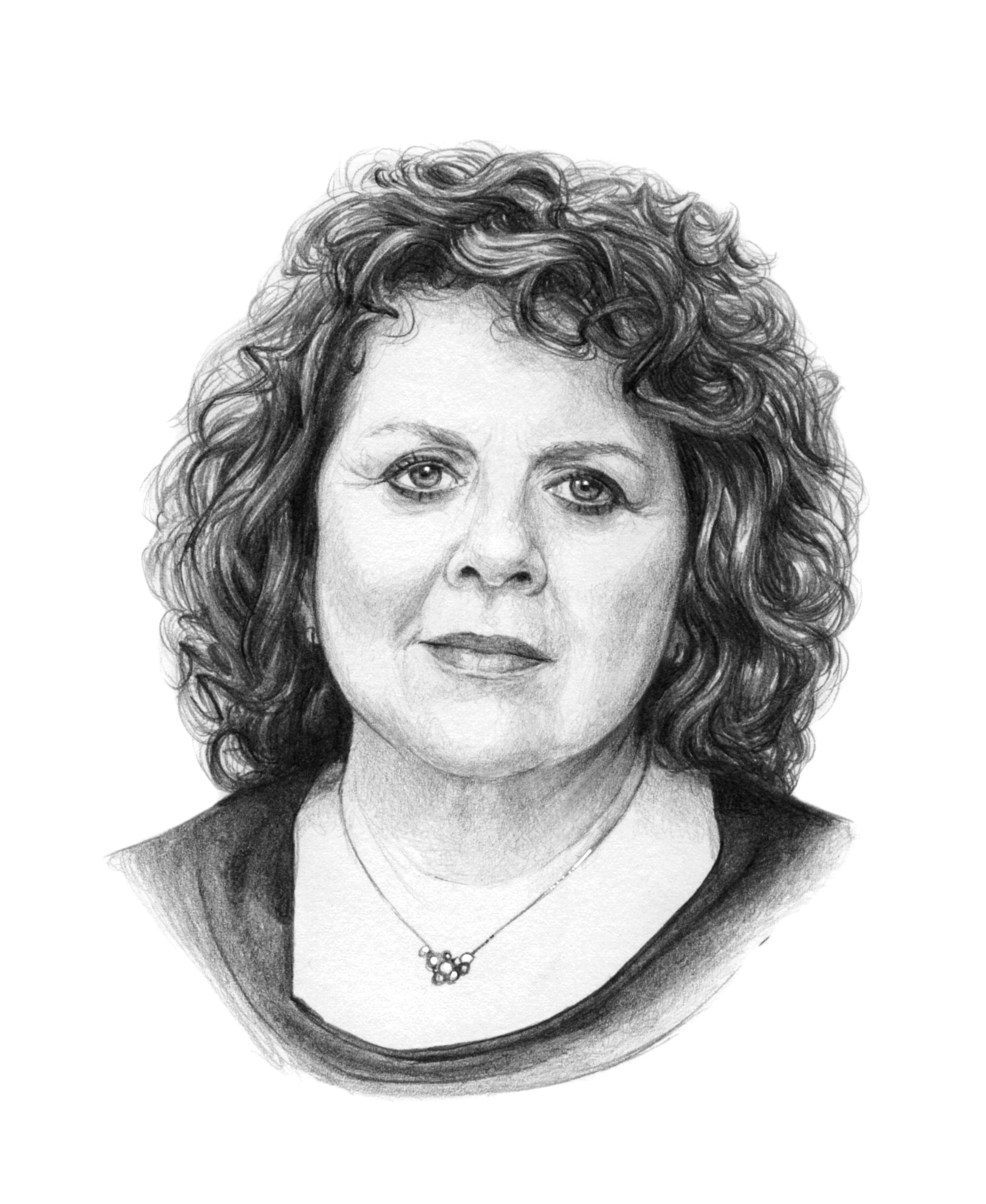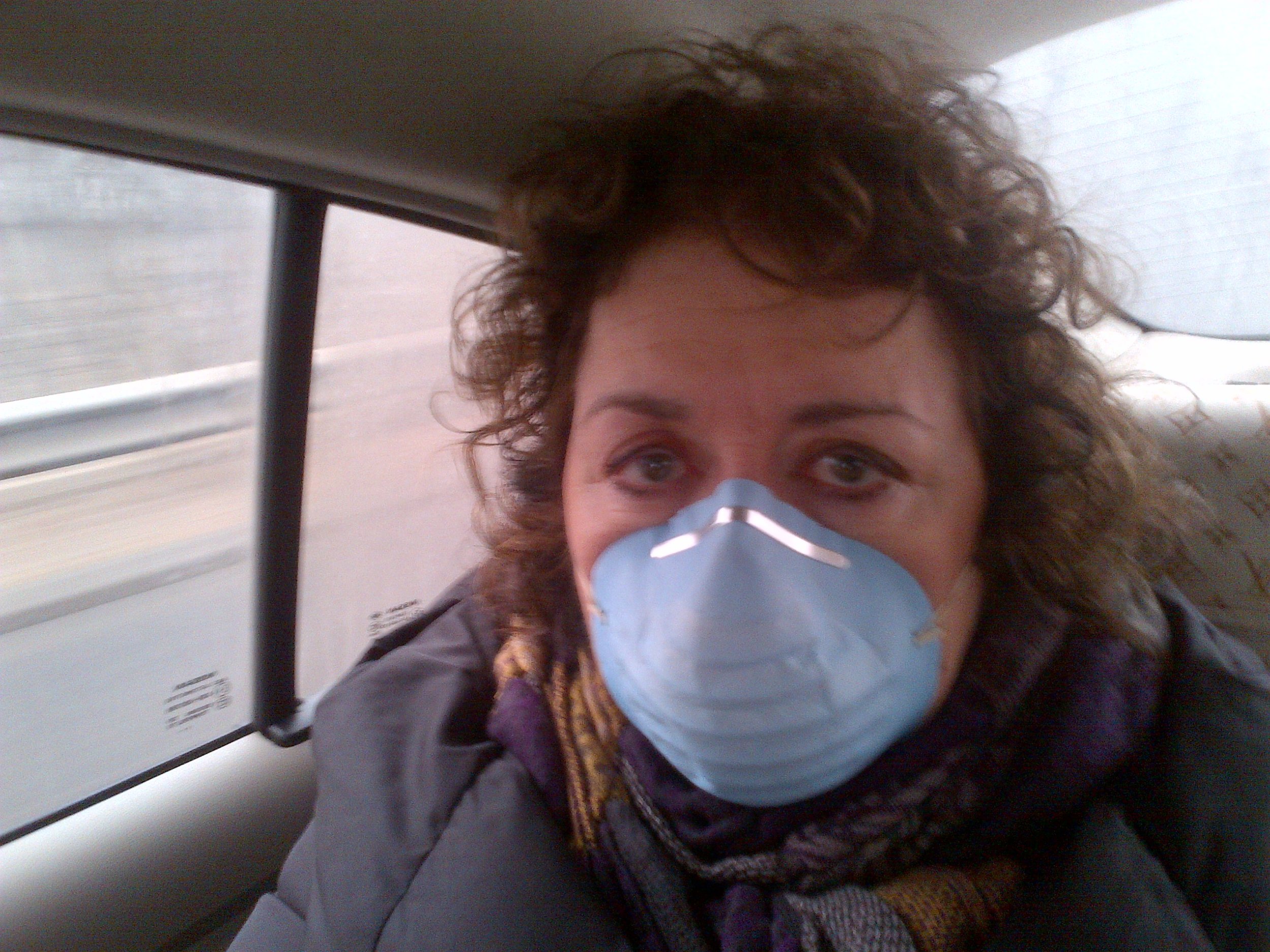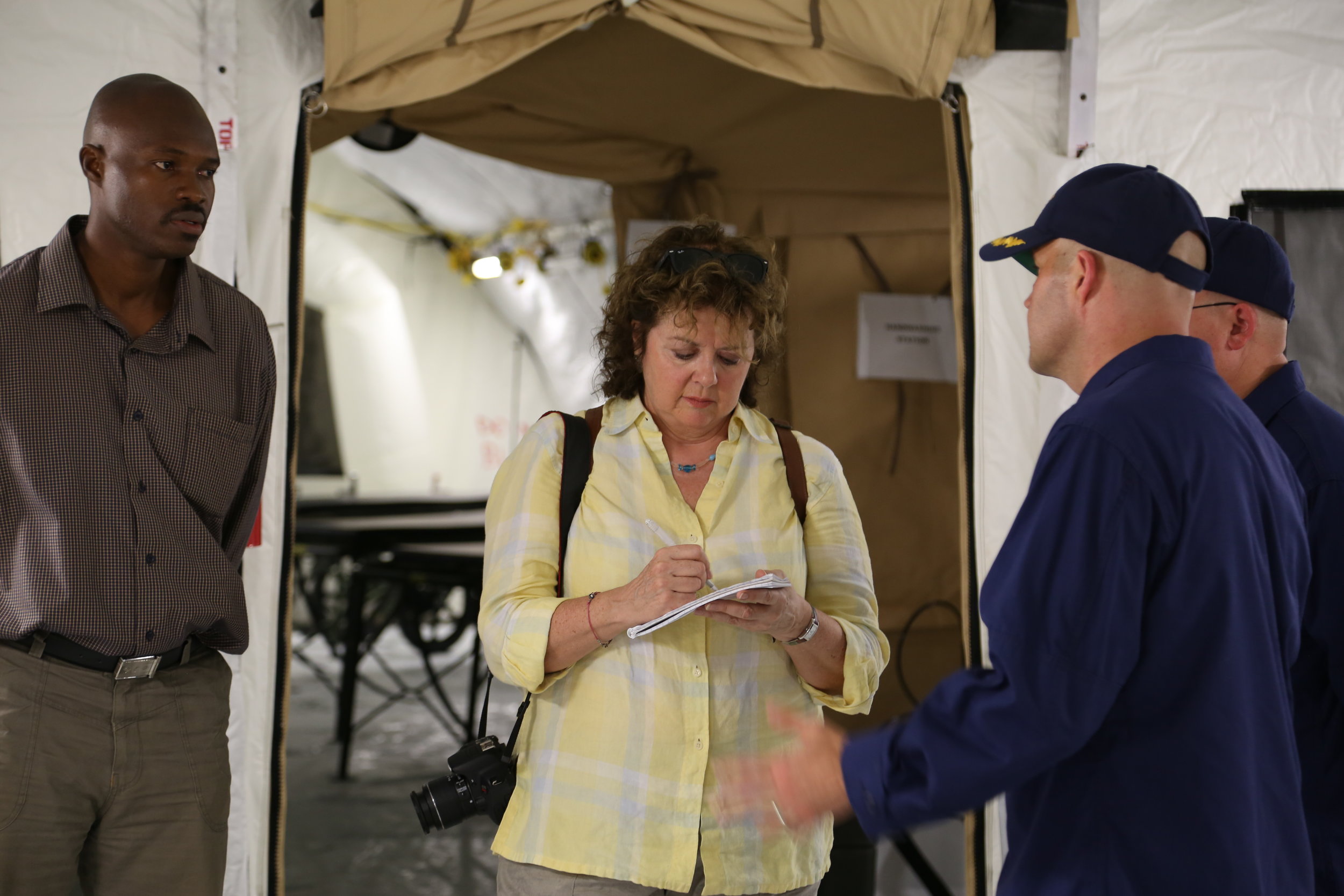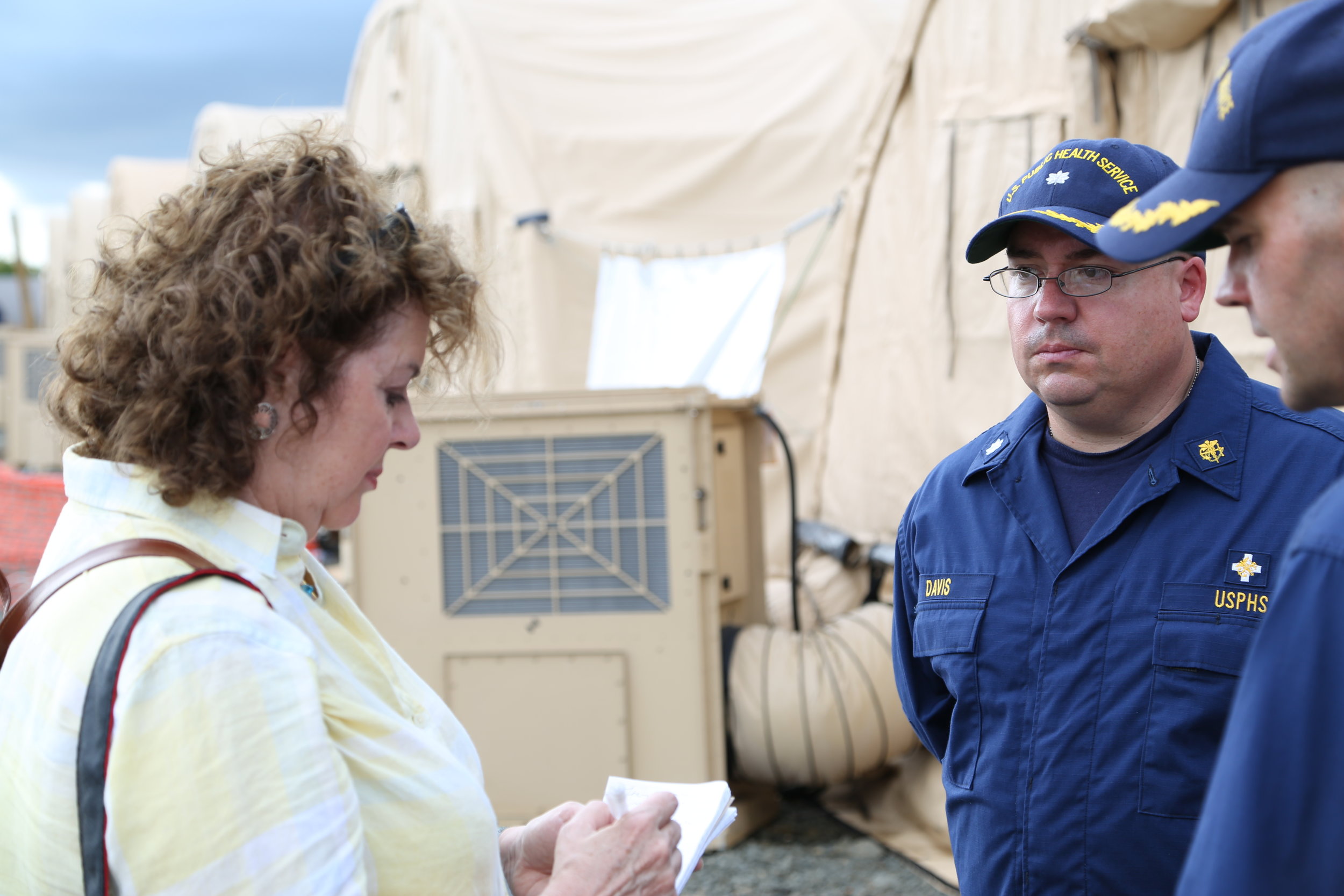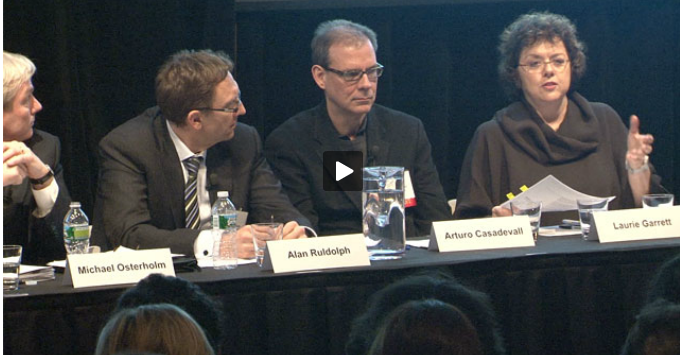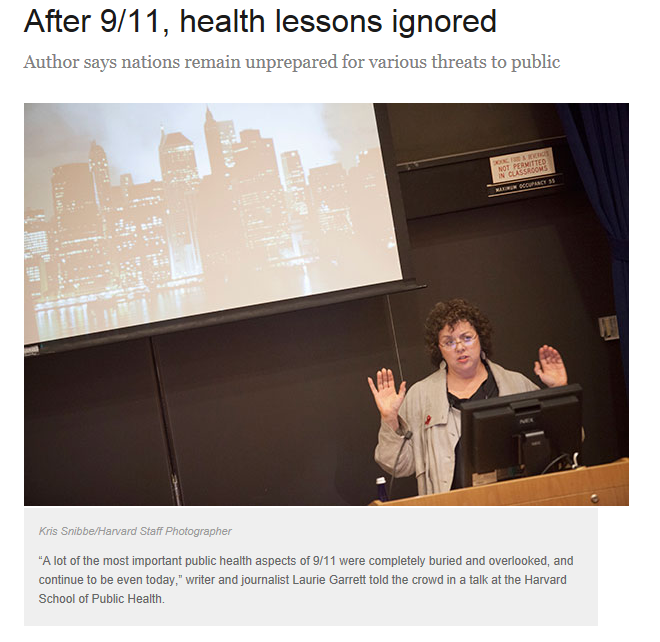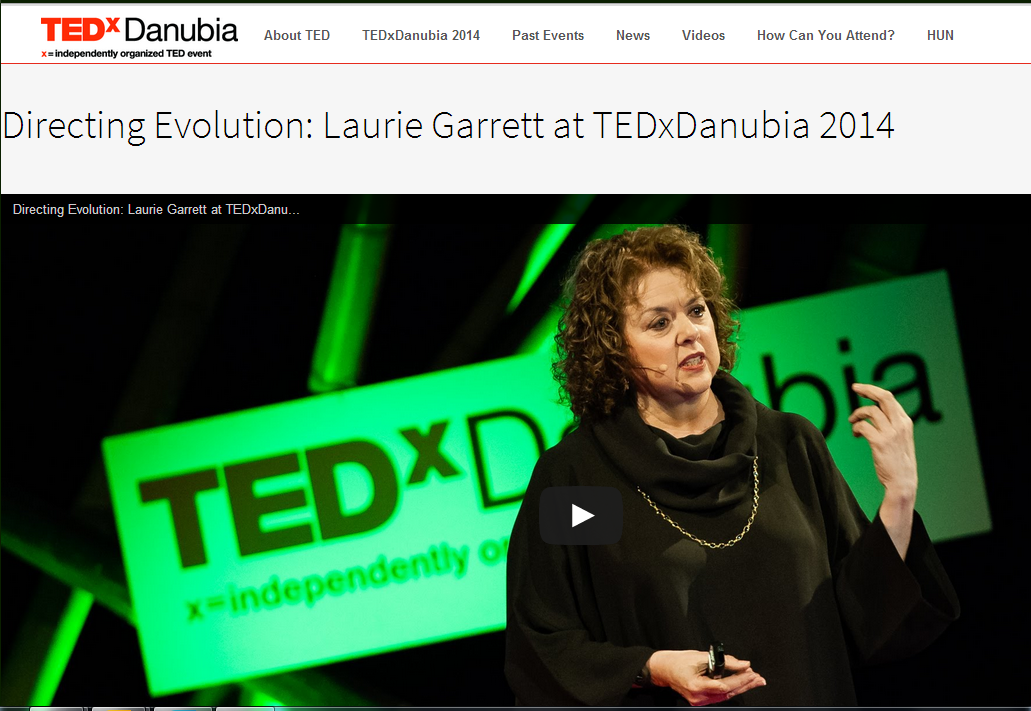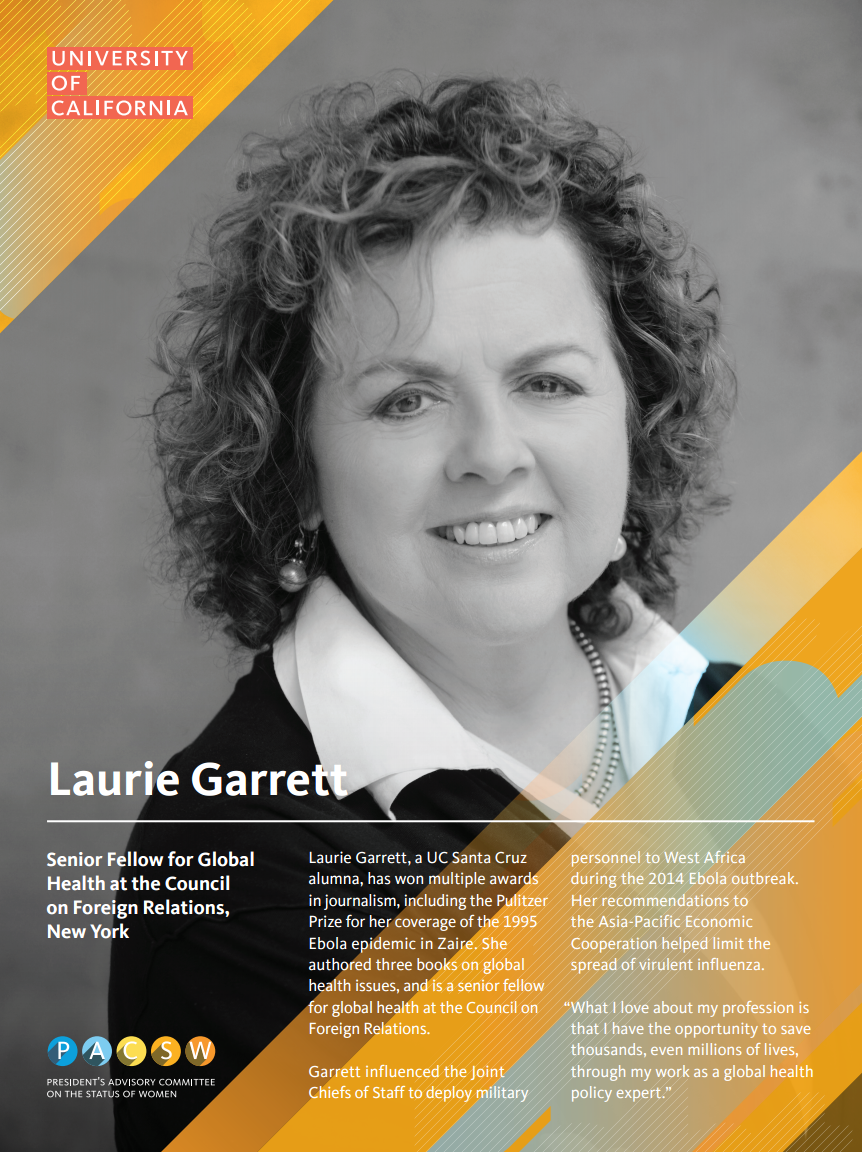Laurie Garrett is the only journalist to have received all of the “Big Ps” of journalism: The Peabody, Pulitzer, and Polk (three times).
With a background in research science, including graduation with Honors in Biology from UC Santa Cruz, PhD work in immunology at UC Berkeley and research at Stanford, Garrett started her journalism career in local radio broadcasting, followed by freelance reporting from Africa, and then as Science Correspondent for National Public Radio. By 1982 she was focused on the unfolding tragedy of HIV/AIDS as the deadly viral disease spread from one continent to another, covering the pandemic from all over the world first for NPR, and then Newsday and New York Newsday. Through the lens of HIV Garrett gained understanding of the social, political and national security aspects of emerging and new microbial diseases, leading to a Fellowship at the Harvard School of Public Health and writing of THE COMING PLAGUE: NEWLY EMERGING DISEASES IN A WORLD OUT OF BALANCE. Just months after its publication, Ebola broke out in Kikwit, Zaire: Garrett embedded with the responding epidemic control team in Kikwit for weeks, and her reporting garnered the 1996 Pulitzer Prize.
Recognizing failures in government, United Nations and private sector responses to disease outbreaks in the U.S., India, central Africa, and the former Soviet Union nations Garrett authored BETRAYAL OF TRUST: THE COLLAPSE OF GLOBAL PUBLIC HEALTH. And Garrett covered both the 9/11 and anthrax attacks extensively, leading to I HEARD THE SIRENS SCREAM: HOW AMERICANS RESPONDED TO THE 9/11 AND ANTHRAX ATTACKS. In 2003 Garrett was on the ground in the SARS epidemic, spending months in Hong Kong and China, and returning in 2005 to examine how Vietnam, Singapore, Japan and China handled the outbreak and its subsequent repercussions on the countries’ health systems and survivors.
At the urging of former U.S. Ambassador to the United Nations Richard C. Holbrooke, Garrett focused on the national security dimensions of naturally emerging and manmade pathogens, as well as the failure of global health systems and governments to prevent and respond to such threats, taking a position as Senior Fellow for Global Health at the Council on Foreign Relations. During her years at CFR Garrett tracked the emergence of deadly H5N1 “bird flu” and worked with the Bush Administration on development of a U.S. pandemic flu plan. She traveled across Liberia and Sierra Leone during the 2014-15 Ebola outbreak, and increasingly worked on climate change, planetary health, and related crises. After nearly fourteen years at CFR, Garrett has returned to her science journalism roots, writing extensively and reporting for multiple outlets, including MSNBC and Substack, on COVID-19 and a long list of health, science, geopolitical and climate concerns.
Along the way, Garrett has received five PhDs Honorus causa, been a finalist for the Pulitzer Prize in Journalism three times (receiving the award in 1996), been a finalist for the National Book Critics Award, three times been awarded the George Foster Peabody Award in Journalism, been named one of the Remarkable Women of the University of California as well as Outstanding Alum of UCSC, been honored with four awards from the Overseas Press Club of America and been cited with numerous other honors. She has worked on several film documentary and movie projects, most notably a six-part series on CNN based on THE COMING PLAGUE and the motion picture Contagion, directed by Steven Soderbergh.
Garrett lives in New York City.
The author
Laurie Garrett wrote her first bestselling book, THE COMING PLAGUE: Newly Emerging Diseases in a World Out of Balance, while splitting her time between the Harvard School of Public Health and the New York newspaper, Newsday. In the 1992-93 academic years Garrett was a Fellow at Harvard, where she worked closely with the emerging diseases group, a collection of faculty concerned about the surge in epidemics of previously unknown or rare viruses and bacteria. The book was published in hardcopy by Farrar, Straus, and Giroux in 1994, and spent 19 weeks on the New York Times bestseller list. Released in paperback in 1995 by Viking Penguin, THE COMING PLAGUE remains in print and continues to sell vigorously. The book was released in e-book form in May 2011.
During the 1990s Garrett continued tracking outbreaks and epidemics worldwide, noting the insufficient responses from global public health institutions in Zaire, India, Russia and most of the former USSR, Eastern Europe, and the United States. This resulted in publication in 2000 of BETRAYAL OF TRUST: The Collapse of Global Public Health, released by Hyperion that year, and in paperback in 2001. BETRAYAL OF TRUST was also a vigorous seller, and remains in print today. It was also released as an e-book in May 2011.
In Summer 2011 , Garrett’s long-awaited third book, I HEARD THE SIRENS SCREAM: How Americans Responded to the 9/11 and Anthrax Attacks, was published in time for the 10th Anniversary of 9/11 by Amazon as an e-book. It is also available on Kindle and in paperback.
Garrett is a Member of the World Economic Forum Global Health Security Advisory Board. She is also a member of the Council on Foreign Relations, and the National Association for Science Writers.
Garrett helped create the Noguchi Africa Prize and has three times served as its judge.
Listed as a twice-ver “Cassandra”, in WARNINGS: Finding Cassandras to Stop Catastrophes (2017), Richard A. Clarke and R.P. Eddy, HarperCollins Publishers.
The Journalist
HOLD FOR BLURB
The Council on Foreign Relations
In 2004, Laurie Garrett left Newsday to join the think tank staff of the Council on Foreign Relations in New York. She created the Council on Foreign Relation's Global Health Program, where she served as Senior Fellow for Global Health from 2004-2017. Garrett has written several reports and articles including: HIV and National Security: Where are the Links?, A Council Report (Council on Foreign Relations Press, 2005), "The Next Pandemic?" (Foreign Affairs, July/August 2005), "The Lessons of HIV/AIDS" (Foreign Affairs, July/August 2005), "The Challenge of Global Health" (Foreign Affairs, January/February 2007), The Future of Foreign Assistance Amid Global Economic and Financial Crisis, A Council on Foreign Relations Action Plan (2009), and CastroCare in Crisis (Foreign Affairs July/August 2010). Learn more about Laurie's work at CFR on their website.
Laurie Garrett Head Shots (click on images to download)
The "Public Intellectual"
Dr. Declan Fahy of Dublin City University presented the following abstract at the Public Communication of Science and Technology conference in Istanbul in April 2016 -- "Knowledge-based reporting of global infectious diseases: The pioneering journalism of Laurie Garrett".
"I explain in this paper how Pulitzer Prize-winning American health journalist Laurie Garrett became one of the world's most influential and authoritative writers on global infectious diseases.
I take Garrett as a case study of what journalism scholar Thomas Patterson and communication researcher Wolfgang Donsbach have called knowledge-based journalism. That is, journalism that applies one or more fields of specialized knowledge to the coverage of complex events, such as pandemics, in order to enhance citizens' understanding and influence policy on these new social threats.
To demonstrate how Garrett came to undertake this form of journalism, I examine the key moments of her career from the 1980s, when she first reported on the new disease of AIDS for the newspaper Newsday, to her most recent journalism on the 2014 Ebola outbreak in her role as Fellow at the US think tank, the Council for Foreign Relations.
Using methodological approaches from cultural and intellectual history, I analyze chronologically her news reports, books - The Coming Plague (1995), Betrayal of Trust (2000) and I Heard the Sirens Scream (2011) - policy reports and social media activity to show how she came to offer a unique, authoritative perspective on global infectious disease. I also situate these texts against the a historical background, where the new field of emerging infectious diseases (EID) developed in the 1990s as a new scientific framework for understanding novel threats such as HIV/AIDS, SARS, bird flu, and Ebola.
I argue that Garrett's work is pioneering in that it offers an original way to conceptualize the work of a health journalist. I argue also that her work shows, in practice, how a knowledge-based reporter can come to wield enormous influence in the public, political, and scientific understanding of health."
The link to the abstract can be found on the PCST conference website.
The Full Person
A native Californian and fifth-generation Los Angelina, Garrett’s family came by covered wagon from Texas in the mid-19th Century and settled in a largely Spanish-speaking El Pueblo de Los Angeles populated by a mere 22,000 people. Both of her parents attended UCLA: Her mother was the first female in her Croatian lineage to attend college. In the Garrett family, Laurie’s grandmother, Evelyne MacKenzie Garrett, was a public health nurse in Los Angeles, and her Aunt Bernice Garrett Silber was a medical social worker. The Garrett tradition of public health service and education in California is a long one.
Garrett flourished in the state’s public school system, from kindergarten, all the way to graduate school. (She was in 2025 named to the San Marino High School Hall of Fame, one of 14 graduates of her secondary school to have been so honored.) She attended the University of California in Santa Cruz (UCSC), majoring in biology and graduated with honors in 1975. She received a National Institutes of Health special fellowship for graduate studies, and entered the PhD program at UC Berkley in the Department of Bacteriology and Immunology. Garrett did cellular immunology research with Leon Wofsy (of “hapten sandwich” fame) at UC Berkeley, and with Lee and Leonard Herzenberg (inventors of the Florescence-Activated Cell Sorter or FACS) at Stanford University.
Garrett did not complete her PhD because her “side hobby” covering science-related news for Berkeley radio station KPFA proved far more compelling. In 1976 as the Nation celebrated the American Bicentennial, Garrett was in the KPFA newsroom, surrounded by the cacophony of teletype and wire machines, when alarm bells rang, signaling a major news story was breaking. The first was word of a strange, deadly outbreak of a never-before-seen disease in Zaire (now known as the Democratic Republic of Congo, or DRC). In a remote place, in a far away land, people were hemorrhaging and dying of something nightmarish. Another set of alarms underscored the death of a private in military boot camp at Ft. Dix, New Jersey, who had perished from a new, severe form of influenza. And a third set of wire machine bells warned that American women were dying of something called Toxic Shock Syndrome, cause unknown.
At a time when clinicians and scientists in wealthy countries had turned their backs on infectious microbial diseases, as they were convinced the new age of vaccines and antibiotics ushered control of viruses and bacteria, strange outbreaks of disease and death pointed to a very different picture. Garrett posed questions of microbial and environmental toxin threats to human health, producing news stories for KPFA, Pacifica News, and the Australian Broadcasting Corporation.
Teamed with Adi Gevins, whose scientific background featured, as she put it, “studying brains,” Garrett produced an irreverent series of radio documentaries (in today’s parlance, podcasts) called the “Science Story,” which was distributed nationally and won the 1977 George Foster Peabody Award for Outstanding Achievement in Broadcasting. Garrett took a leave from graduate school to pursue study of environmental toxins used as pesticides, working for the California Department of Food and Agriculture.
At the urging of famed San Francisco Chronicle Science Writer David Perlman, Garrett moved overseas, working as a freelance foreign correspondent for the BBC, Pacifica and other outlets, in Europe and sub-Saharan Africa. She covered the SALT II talks between President Jimmy Carter and Soviet Premier Leonid Brezhnev; wars in southern Africa; British withdrawal from Rhodesia and creation of Zimbabwe; the African National Congress and other national liberation groups from across the African region. And, most crucially, she investigated measles epidemics, famine and malnutrition and the sorry state of health facilities in the region.
On return to the U.S. Garrett became Program Director of KPFA, and then a science correspondent for National Public Radio. For eight years she covered everything from neutrinos to noroviruses for NPR, based in San Francisco and Los Angeles. When an awful new disease swept through the gay population of San Francisco, Garrett covered it intensely and soon recognized that the ailment that would be dubbed Acquired Immune Deficiency Syndrome, or AIDS, was as much a political and social catastrophe as it was a medical one.
In 1984 Garrett returned to Africa for NPR, tracking the exploding AIDS pandemic from one country, to another, wreaking devastating outcomes for the social fabric of entire nations. Convinced that the origins narrative for HIV, which typically blamed gay men for the virus’ emergence, and female sex workers and IV drug users for its spread around the world, was wrong, Garrett pursued early cases of the disease in Africa. And she returned to reconsider those loud wire service alarms she had heard in the KPFA newsroom a decade earlier: Was there perhaps a common thread between that mysterious 1976 bleeding disease in Zaire, dubbed Ebola, the Swine Flu fiasco in the U.S. in the same year, Toxic Shock Syndrome and HIV?
In 1988 Garrett joined the staff of Newsday and New York Newsday as a Science Correspondent, continuing her focus on HIV’s rising and horrible toll around the world, and the unique patient activism it spawned, especially in the U.S. Among other things, it led to unprecedented transformations of research and drug approval processes at the National Institutes of Health and the Food & Drug Administration. HIV spawned a unique set of reactions to disease, exposing the prejudices and biases in public health, scientific research and government responses to microbes that threaten so-called “marginalized people” – the poor, gay men, drug users, sex workers and other outcast groups. Garrett contributed to AIDS in the World, volumes I and II, with Jonathan Mann, Daniel Tarantola and Thomas Netter – books that aimed to demonstrate the human rights and governance aspects of the pandemic. She also wrote a section of AIDS: The Women, edited by Ines Reider, which anticipated the pandemic’s spread to vulnerable women around the world.
In 1989 Drs. Stephen Morse of Columbia University and Joshua Lederberg of Rockefeller University organized a landmark meeting at the National Academies of Sciences in Washington that Garrett attended; it focused on newly emerging, or reemerging viruses around the world. For three days scientists described the puzzling appearances of new viruses in their respective fields, and by the gathering’s end it was clear that HIV was not unique. Rather, it was a bellwether.
Garrett took a leave from Newsday to be a 1992-93 Fellow at the Harvard School of Public Health, where she more deeply scrutinized the causes of disease emergences of both viruses and bacteria. She collaborated with an infectious diseases working group of Harvard faculty on a book on the topic and wrote most of the first draft of The Coming Plague: Newly Emerging Diseases in a World Out of Balance. Published in October 1994 by Farrar, Straus & Giroux, the book jumped to the New York Times bestseller list and was a Finalist for the National Book Critics’ Award for best nonfiction of 1994.
In the spring of 1994 pneumonic plague broke out in Seurat, India, creating a nationwide panic. Garrett spent weeks in Seurat tracking spread of the plague, and reporting for Newsday on extreme social reactions to the completely preventable and treatable bacterial disease.
In January 1995 Ebola broke out in Kikwit, Zaire, and Garrett embedded in the community for weeks of the epidemic, reporting for CNN and Newsday. She tracked its spread across the region and bore witness to the courageous work of local doctors, scientists, religious leaders, local Red Cross, Medecins Sans Frontieres (MSF) volunteers and World Health Organization-sponsored disease detectives from all over the world. Her reporting for Newsday received the 1996 Pulitzer Prize for Explanatory Journalism.
With the fall of the Berlin Wall the former Soviet Union and Warsaw Pact nations opened to the West, exposing the flaws and corruption of biological sciences, medicine and public health under communism. For months Garrett traveled across Russia, Ukraine, Georgia, Estonia, Czechoslovakia and the former East Germany reporting on everything from a massive diphtheria epidemic among unvaccinated Russian and Ukrainian children, to radiation illnesses in those exposed to the Chernobyl nuclear explosion, the scale of the old Soviet biological warfare effort, what passed for “infection control” in Soviet operating theaters, highly drug-resistant tuberculosis and Siberia and Georgia, and HIV. The result was a 32-part series of special reports in Newsday, “Collapsing Empire,” which won a George C. Polk Award, and was a finalist for the Pulitzer Prize.
After scouring the old VECTOR facility outside Novosibirsk Garrett recognized the extraordinary scale of Soviet biological weapons development efforts. In a series of reports for Newsday and Foreign Affairs she interrogated the surge in construction worldwide of high containment biology laboratories and use of genetic engineering techniques to enhance the infectiousness and virulence of microbes. That led her increasingly into national security territory, and such international peace efforts as the Chemical & Biological Weapons Control Treaty.
The 1996 discovery of cocktails of powerful drugs to treat (but, sadly, not cure) HIV infection opened a chasm in the AIDS pandemic. In rich countries people who had just a year earlier been planning their funerals were rising like Lazarus, returning to full time employment, even building retirement portfolios. But the same life-sparing miracles were not available to most AIDS sufferers, as they lived in countries too poor to provide the then-costly treatments. As activists protested the inequities, and global health leaders created alternative mechanisms of manufacture, finance and distribution of the drugs, eyes turned to WHO and the United Nations, and the structure of global health worldwide.
In 2000 Garrett published her second major book, Betrayal of Trust: The Collapse of Global Public Health, scrutinizing inequities and failures in health delivery around the world. Based on first-hand reporting from the 1994 plague epidemic in India, the former Soviet region, misuse of antibiotics and rising drug resistance in bacteria, the book took a systems approach to explaining how, and why, governments often fail to provide health to the people they serve. The book won a slew of awards, including another George Polk, and an Overseas Press Club award.
In September 2001 Garrett felt her apartment building shake, raced to the rooftop and witnessed the second passenger jet hijacked by Al-Qaeda terrorists slice through one of the Twin Towers of the World Trade Center. She raced to the Brooklyn Bridge, interviewing people as they fled downtown Manhattan, and reached the span’s end at City Hall when the first tower collapsed, engulfing the area in smoke and debris. For days Garrett worked downtown as a reporter, covering efforts to rescue, and then retrieve bodies of victims, and concerns about the chemically unique plume of smoke that rose from the 4000-degree cauldron formed by compression of the two 110-story towers. A month later, amid the anthrax panic, she covered the mysterious mailings of toxic powder to politicians and media. White House officials warned her that she was a likely target for whomever was responsible for the anthrax mailings, and Newsday took exceptional security precautions to protect its mail facilities. From these two tragedies, which spawned the American War on Terrorism and increasing concerns about biosecurity, New York City found resilience. Garrett chronicled it all, writing and investigating for 9 years. I Heard the Sirens Scream: How Americans Responded to the 9/11 and Anthrax Attackswas published by Kindle Books on the tenth anniversary of 9/11.
In 2003 another new disease emerged, spreading swiftly to 31 counties, dubbed Severe Acute Respiratory Syndrome, or SARS. The outbreak began in China’s Guangdong Province, and spread across the PRC, Hong Kong, Vietnam, Singapore, Thailand and other nations. Garrett spent six months in Asia, mostly in China, tracking the disease and government responses to it. She was able to gain entry to the live animal market in Guangzhou where infected wild civets were sold to exotic foods restaurants, spawning the outbreak. Her work on SARS garnered another finalist slot for the Pulitzer Prize.
The following year Garrett resigned from Newsday, taking a position as Senior Fellow for Global Health at the Council on Foreign Relations. For more than 13 years she worked to put HIV and other pathogens on the nation’s national security agenda, developed pandemic response plans – especially for virulent influenza and the 2014 Ebola epidemic – and tried to improve the architecture, funding and strength of global health, especially for outbreak response and control. Garrett worked closely with the Bush Administration on surveillance and preparedness for a particularly concerning new microbe, H5N1 influenza, and advised the Joint Chiefs of Staff regarding U.S. military responses to Ebola in West Africa, 2014.
During her time at CFR Garrett published widely on global health, and the rising polycrisis threat of climate change, biodiversity loss, rainforest encroachment and microbial disease. She covered the 2014-15 Ebola epidemic in Liberia and Sierra Leone, returned to Asia to retrace the steps of the 2003 SARS epidemic, and became increasing concerned about the role climate change was playing in not only human health, but plant and animal extinctions. As scientists put genetic sequencing tools to use studying the microscopic world of microbes (viruses, phages, fungi, parasites, bacteria), a collective frame shift in thinking about organization of the planet emerged. Humans and other large animals contain more microbes than their cells. In the 21st Century scientists came to appreciate that the diversity and interactions within that microscopic world influence everything from human digestion and food cravings to brain function and cancer. In the natural world microbial interactions form communication networks among forest trees and build the coral reefs that act as the lungs of the seas. Garrett could see that the real danger of climate change devastation of these delicate networks of life. She began examining these trends in the Arctic: Greenland, Svalbard, northern Norway and Sweden, and was working on a new book covering these issues when COVID-19 struck Wuhan, China in December 2019.
The COVID-19 pandemic hit New York City especially hard in early 2020, and again in 2021. Working under lockdown from home, Garrett wrote warnings and appeared on countless TV, radio and podcast shows carrying the message that humanity was grossly underestimating the danger the new SARS-CoV-2 virus posed. She participated in a series of confidential, virtual meetings with prominent national security and disease experts in the U.S. and China, hoping to bridge the gap between the nations for a swift, shared response to the virus. But it was not to be: In a lengthy cover story for the March 2020 New Republic Garrett explained why Xi Jinping and Donald Trump were the two worst possible leaders for the historic moment, predicting the epidemic would usher extraordinary economic and political changes in the world order.
Throughout 2020-2023 Garrett served as a pandemic commentator for the BBC, CNN, MSNBC, Foreign Policy and other outlets. She saw her role as that of a clarifier, trying to speak to public fears, angers, prejudices and needs.
The pandemic found millions of people worldwide streaming Steven Soderbergh’s 2011 Contagion, starring Matt Damon, Kate Winslet, Jude Law, Laurence Fishburne and Gwyneth Paltrow. As one of three scientific consultants for the film (along with Drs. Ian Lipkin and Larry Brilliant), Garrett pushed for an accurate vision of how societies react to deadly plagues, based on her years of experience in epidemics. She was especially insistent that Jude Law’s character, an internet liar who hawks bogus cures, play a major role: She was convinced future outbreaks would find Science and serious journalism shoved aside in favor of wild rumors, dark conspiracy theories, and highly politicized attacks on public health measures that might have short term consequences for economic and supply systems.
As COVID played out, it often felt as if Contagion had been brought to life.
Among her most recent awards for her global health work and publishing are the 2014 NYU School of Medicine “Outstanding Contributions to Global Health,” and the 2015 Internationalism Award from the American Women for International Understanding. In 2017 she was named one of 10 “Remarkable Women of UC,” by the Board of Regents of the University of California. In 2024 she was named by the George C. Polk Awards one of the 16 “Greatest Investigative Journalists of the Last Half Century.” Garrett has been awarded five honorary PhDs, honoris causa, from Wesleyan University (Illinois), University of Massachusetts (Lowell), Georgetown University, the Carl Icahn Mt. Sinai School of Medicine and Rutgers University.
Garrett currently serves as a judge for the Hiroshi Noguchi Africa Prize (Japan’s version of the Nobel Prizes in science and medicine) and as a Board member for the Francois Bagnold Center for Health and Human Rights at Harvard University. Her currently writings can be found on Squarespace, X, BlueSky and wherever decent journalism continues to be practiced.
On a personal note, Garrett formerly co-owned Havens Winery in Napa, California, which produced renowned Merlot,Albariño, Cabernet, and Syrah vintages and blends. An avid cyclist, Garrett has bike-toured many places, including in Italy, Croatia, Montenegro, Sweden, Norway, Bosnia andHerzegovina, the United States and Canada. The bike and subways are her primary modes of transportation in New York City, where she has resided since 1988, not owning an automobile since 1989.
